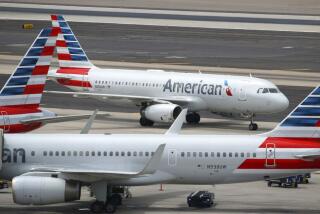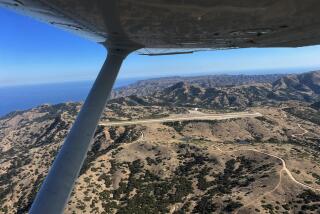Straighten Up, Fly Right : Flight Crew’s Conviction May Cause More Pilots to Seek Rehabilitation
- Share via
COSTA MESA — When Joseph A. Pursch boards a commercial airliner, he routinely looks into the cockpit for a pilot that he knows. He frequently recognizes someone.
The reason is that Pursch is medical director of the Addiction Institute, which provides treatment for commercial pilots who are alcoholics. He claims to have treated more than 500 commercial pilots for alcoholism over the past 20 years.
He is one of seven psychiatrists nationwide who work as consultants for an alcohol treatment program that has the support of the airline industry, the Airline Pilots Assn. and the Federal Aviation Administration.
The program, which seeks to rehabilitate rather than fire pilots, has come into focus recently because of the highly publicized case of three Northwest Airlines pilots accused of flying an airliner with 91 passengers while inebriated.
A federal jury in Minneapolis convicted the three former Northwest pilots of flying while intoxicated. The convictions were the first under a 1986 federal law cracking down on drinking and drug use in commercial transportation.
Pursch said Monday that the convictions would encourage more pilots to get into the treatment program. “It means probably more alcoholics will be more careful about drinking and flying and maybe more will seek help,” he said.
Alcoholism tends to be more prevalent among commercial pilots than in the general population because today’s pilots often begin their flying careers in the military, where heavy drinking was the social norm at officers’ clubs, Pursch said.
In addition, he said, alcoholism tends to be found more among men with macho personalities who spend a lot of time on the road--characteristics associated with pilots.
Pursch, who is a pilot and spent 20 years as a Navy flight surgeon, says pilots in the services are closely supervised and may be ordered into alcohol rehabilitation programs if a problem arises.
But in the private sector, he said, pilots find that supervision is far more relaxed and that they can easily call in sick if they are recovering from a drinking binge. The result, Pursch said, is that commercial pilots can deny their alcoholism longer and the disease becomes far more advanced.
No fatal accidents have been recorded in the airline industry in which alcoholism was found to be a contributing cause. The incidence of pilots actually boarding a plane while drunk is rare, Pursch acknowledged, because they fear getting caught and jeopardizing their careers.
“What is even more dangerous,” he said, “is that they will fly with a hangover, at which time they are more of a danger to us, the flying public, because they are approaching withdrawal symptoms. But if you did a blood test on them, their alcohol level would be zero.”
Pursch criticized the courtroom argument of a defense attorney for one of the Northwest Airlines pilots who said his client did not get drunk easily because he is an alcoholic.
He said that alcoholic pilots may indeed fly better with a few drinks under their belt than while suffering from withdrawal jitters but that they would have difficulty reacting properly if something unexpected occurred. He said that chronic drinkers also are irritable and that their learning ability may become impaired.
The only way to make an alcoholic pilot a safe pilot once again, he said, is with rehabilitation. He said the airline industry is more “enlightened” than all other industries because since the early 1970s it has regarded alcoholism as a treatable disease, collected data about treatment success rates and designed its own rehabilitation program.
Among the nation’s airlines, he said, Northwest a year ago was the last to acknowledge that alcoholism is a problem among its pilots that should be addressed.
Pursch said the treatment program used in the airline industry since 1973 provides a month of hospitalization for alcoholic pilots, after which they usually go back on flight duty but are monitored closely for two more years. During those two years, they are interviewed monthly by a doctor, their union representative and their flight manager, who is their boss. Also they are required to attend meetings of Alcoholics Anonymous.
The program has worked for 92% of the 1,500 pilots who have been treated, Pursch said, many of whom now encourage their colleagues into rehabilitation. He said there are no penalties associated with seeking treatment.
“The pilot can go back to work without losing seniority or any other benefits,” he said. “But if a pilot refuses to cooperate, he will be discharged from flying status.”
Nonetheless, Pursch said he believes that there are many alcoholic pilots who are not receiving treatment. Those who do, he said, generally are reported to their employers by angry or worried spouses or after an arrest for drunk driving or other disorderly conduct.
“They may be flying 15 years or longer before they are discovered,” he said.
To divert alcoholic pilots into treatment earlier, Pursch said he advocates including a liver function test as part of the routine physical exam that all commercial pilots receive every 6 months.
Pursch said one of the most significant changes he sees in recovering alcoholic pilots is their attitude about the seriousness of their drinking.
“When they first come for treatment they rationalize that they are not a threat to the public. They are more concerned about their job,” he said. “Once they are treated, they look back and realize that they often flew when they shouldn’t have and they could have become a danger.”
PILOTS CONVICTED: Three former Northwest Airlines pilots were found guilty of flying a jet while intoxicated. A1
More to Read
Sign up for Essential California
The most important California stories and recommendations in your inbox every morning.
You may occasionally receive promotional content from the Los Angeles Times.













